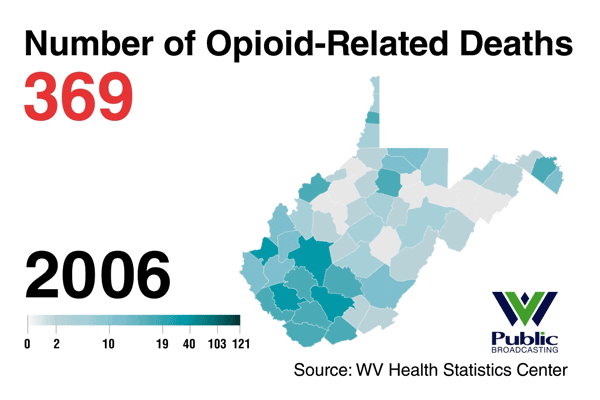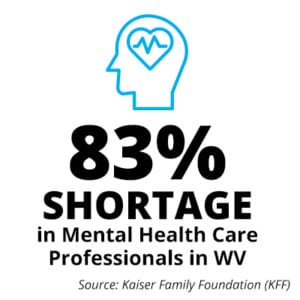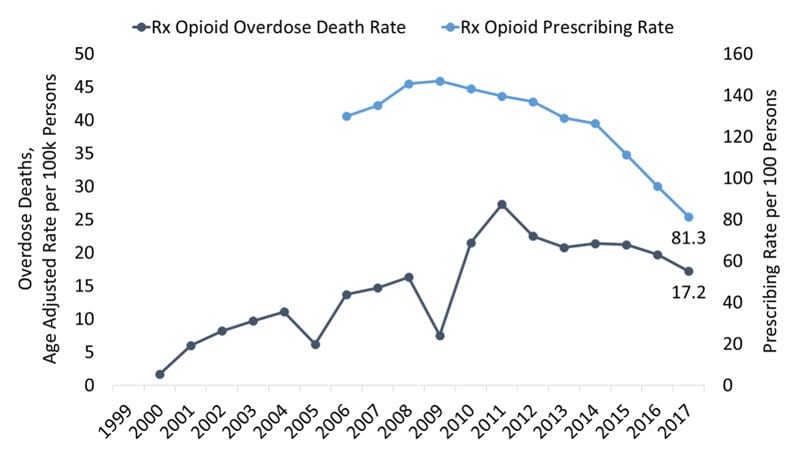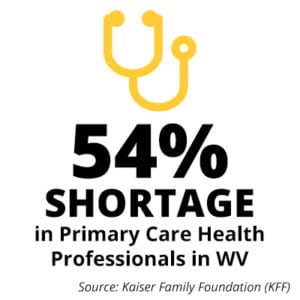It’s hard not to be painfully aware of the current state of the opioid crisis in Central Appalachia and specifically West Virginia. But diagnosing true solutions to the opioid crisis is almost equally painful.
Although the opioid crisis is not isolated to West Virginia, the sad fact is that this state has the highest age-adjusted rate of drug overdose deaths involving opioids. As an educational institution serving over 2,500 students located in WV, we are sensitive to the fact that there is no “one size fits all” fix to this problem, and that it will require the efforts of many people to provide solutions to the opioid crisis.
Before moving forward, it’s always a good idea to have a solid understanding of where you’ve been. Let’s take some time to look back at the development of the opioid epidemic in West Virginia before we examine the career options available to students who complete a graduate program of study in clinical psychology, criminology, or physician assistant studies.
Opioids in West Virginia: How Did We Get Here?

Over-prescription of opioids in the United States actually dates back to the late 1990s, according to research published in The Journal of Bone and Joint Surgery. While research does indicate that opioid use is growing globally, the general consensus is that this epidemic is largely isolated to the United States. Moderate to very strong natural and synthetic opiates have become the most-prescribed class of pharmaceutical painkillers in our country over the last two decades, according to research from the US Surgeon General.
While that is a brief explanation of how the problem started nationwide, the severity of the crisis has been felt with great impact here in West Virginia.
According to research by the Healthcare Administration program at Marshall University published this past April in Health Care Management, a combination of four main factors are driving the accelerated rise of opioid overdoses in West Virginia:
- Depressed economy
- High rates of prescribing and dispensing opioids
- Lack of education
- Sociocultural factors (customs, lifestyles, and values)
So while the opioid epidemic is a significant problem around the country, the impact of the problem can be uniquely felt here in West Virginia.
And the data on how opioid drug abuse is impacting our state is shocking and hard to ignore. So what exactly does the opioid crisis look like here in the Mountain State?
According to data collected by the National Institute on Drug Abuse, the drug overdose death rate involving opioids is three times higher in West Virginia than any other state.
Arrest and incarceration rates related to drug crimes have also grown at an alarming rate over the last 16 years.
Because of these challenges, our future criminal, medical, and mental health workforce will have an unprecedented opportunity to face the opioid crisis head-on. But just because the opioid epidemic is a nationwide challenge doesn’t mean you need to leave home to do your part to help reverse its course.
Learn more about how taking your next career step with a graduate degree in clinical psychology, criminology, or physician assistant studies can provide you with an opportunity to change the course of our state’s opioid epidemic.
The Role of Clinical Psychology Graduates in the Opioid Crisis

According to statistics compiled by the Kaiser Family Foundation (KFF) in December 2018, the state of West Virginia only meets 16.89% of its need for mental health care professionals. In fact, just to remove itself from the status of being a mental health care shortage area, West Virginia needs to more than double its total amount of mental health practitioners.
In a clinical psychology career path, you are bound to encounter more people dealing with mental health challenges related to the opioid crisis, whether they are in recovery or still struggling with a dependency.
Our 54-credit hour clinical psychology masters degree program meets the licensure requirements set forth by the WV Board Examiners of Psychology. So in addition to getting the skills necessary to diagnose and properly care for individuals impacted by the opioid crisis, you will also be able to professionally practice as a licensed psychologist in the Mountain State without pursuing a doctorate.
The Role of Criminology Graduates in the Opioid Crisis
According to annual reports filed by the West Virginia Division of Corrections and Rehabilitation, state inmate volume related to drug crimes has increased over 260% during the reported timeframe of the opioid crisis (2002 versus 2018).
But while the number of arrests and inmates imprisoned in West Virginia related to drug crimes has been on the rise, the Bureau of Justice reported in 2016 that the number of full-time sworn police officers per resident in the United States has decreased.
An increase in the number of people needing to be served by the justice system compared to a decline of frontline justice professionals is a bad combination to create solutions for the opioid crisis.
The fields of Criminology include professions like correctional officers, crime scene examiners, detectives, police officers, private investigators, and probation officers. Professionals in these fields will all have the opportunity to work directly with those impacted by the effects of the opioid crisis in corrections, court-related services, and law enforcement.
Similar to their counterparts in the medical professions, they will be on the frontlines dealing with individuals who suffer from the struggles associated with opioid dependency.
Continuing their education at West Liberty can be a critical step forward in helping this region overcome the impact of the opioid epidemic.
The Role Physician Assistant Graduates Can Have on the Opioid Epidemic
According to statistics compiled by the KFF in December 2018, the state of West Virginia only meets 45.9% of its need for primary care health professionals. If you have a desire to work in rural healthcare settings, this just might be the opportunity for you. To be removed from KFF’s list of states in need of primary care health professionals, the state of West Virginia needs to almost double its current total of PA’s to meet demand.
If you have some awareness of the nature of medical care from your experience as an EMT, military corpsman, nurse, respiratory therapist, or surgical tech and want to prepare yourself to encounter more patients dealing issues from prolonged exposure to medium and maximum strength painkillers, there may not be a more important time for you to pursue becoming a Physician Assistant.
At WLU, you will be getting the skills necessary to diagnose and properly care for these individuals. Commit yourself to a profession dedicated to providing compassionate, quality care while doing your part to help reverse the course of the opioid crisis.
Final Thoughts on Graduate Degree Solutions to the Opioid Crisis in West Virginia
The number of deaths related to opioid prescription and the prescription rate of opioids per 100 people is declining, so the state of West Virginia is actively taking steps towards addressing the epidemic.

However, according to the CDC, West Virginia still rates in the top 10 in the US in both categories.
On top of that, full-time law enforcement careers and law enforcement degrees are on the decline nationwide, West Virginia has a shortage of mental and primary health care professionals, and drug-related crime rates are on the rise.
Many of the graduate programs offered by West Liberty University are training tomorrow’s law and medical professionals to directly combat the opioid epidemic in West Virginia. If you are someone who wants to do something to help our state overcome this great challenge, talk to us to see how these graduate degree programs can help you accomplish that goal.

